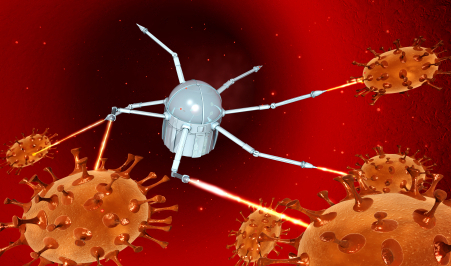Nanomachines
Nanomachines (nanites) are small computers that are measured in nanometers and can perform tasks on a molecular level. They are relatively new, and while only a theory just a few years ago, they are quickly being integrated into a wide variety of industries and products. It has been projected that within one or two decades, nanomachines will make it possible to do many new things such as decipher the human genome, change the flavor of any food on demand, and create body armor that is both stronger and lighter than Kevlar. The possible applications of nanomachines are limitless, making it one of the most profitable and advanced industries of the near future.
Health
As nanomachines are 2.5 times smaller than DNA, they can easily fit inside of human cells in order to perform tasks such as repairing tissue damage, destroying harmful cells, or making small nanoscale incisions. Nanomachines have already made it possible for the health care industry to introduce bandages that soak into the patient’s skin and do minor repair to tissue that infection, stab wounds, or abrasions damaged. In conjunction with stem cells, the health care industry has also provided a new means of delivering important basic DNA elements to damaged cells. This has consequently led to a revolution in disease control, prevention of chronic disorders, and the reversal of current mental and physical  disorders.
disorders.
Biological Enhancements
In addition to aiding with good health in general, nanomachines will also soon be able to provide humans with biological enhancements such as additional muscle tissue, stronger bones, and better senses. Nanomachines will also be able to physically alter human cells. This means that when scientists perfect the map of the human genome, nanomachines could be programmed to change specific physical characteristics such as eye color, skin color, hair color, height, weight, nail and hair growth, and even gender. Likewise, nanomachines will soon allow cloning to be more practical and efficient and may provide a solution to the problems that cryogenics faces.
Food
Surprisingly, nanomachines have affected the food industry just as much as any other. Nanomachines are currently being used in experiments to alter the physical features and characteristics of food. The idea is to create a device or mechanism that can change the taste, texture, appearance, and even nutritional content of any food. While this may seem unbelievable, it is expected to become available to the general public in the near future.
Crime
Nanomachines have helped law enforcement in Britain and other places around the world catch shoplifters by tracking nanosized RFID chips or bar codes that can only be deactivated upon purchase. Retail outlets in Europe, and now some in the United States, have recently been including these items in their products because shoplifters cannot see or deactivate them.
Sports
Nanomachines allow sports equipment manufacturers to create products that are much more flexible, durable, shock resistant, and stronger than similar products. Athletes will soon have a much more diverse assortment of gear as nanomachines will allow many new technologies to arise, thereby allowing the development of new sports altogether.
Appliances
Nanomachines are already being used in common household appliances such as refrigerators and washing machines. In these types of appliances, billions of nanosized particles of colloidal silver are continuously released in order to sterilize surfaces and clothes. Colloidal silver is an antibacterial and antimicrobial. This means that the small particles of colloidal silver prevent germs and other microbes from building up. In fact, the washing machines that use silver nanoparticles are capable of keeping clothes sterile for up to one month after each wash. In addition to appliances, several cleansers that use colloidal silver have been introduced to the market.


Comments - No Responses to “Nanomachines”
Sorry but comments are closed at this time.